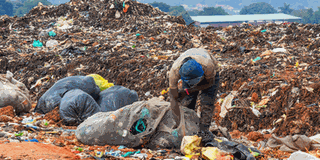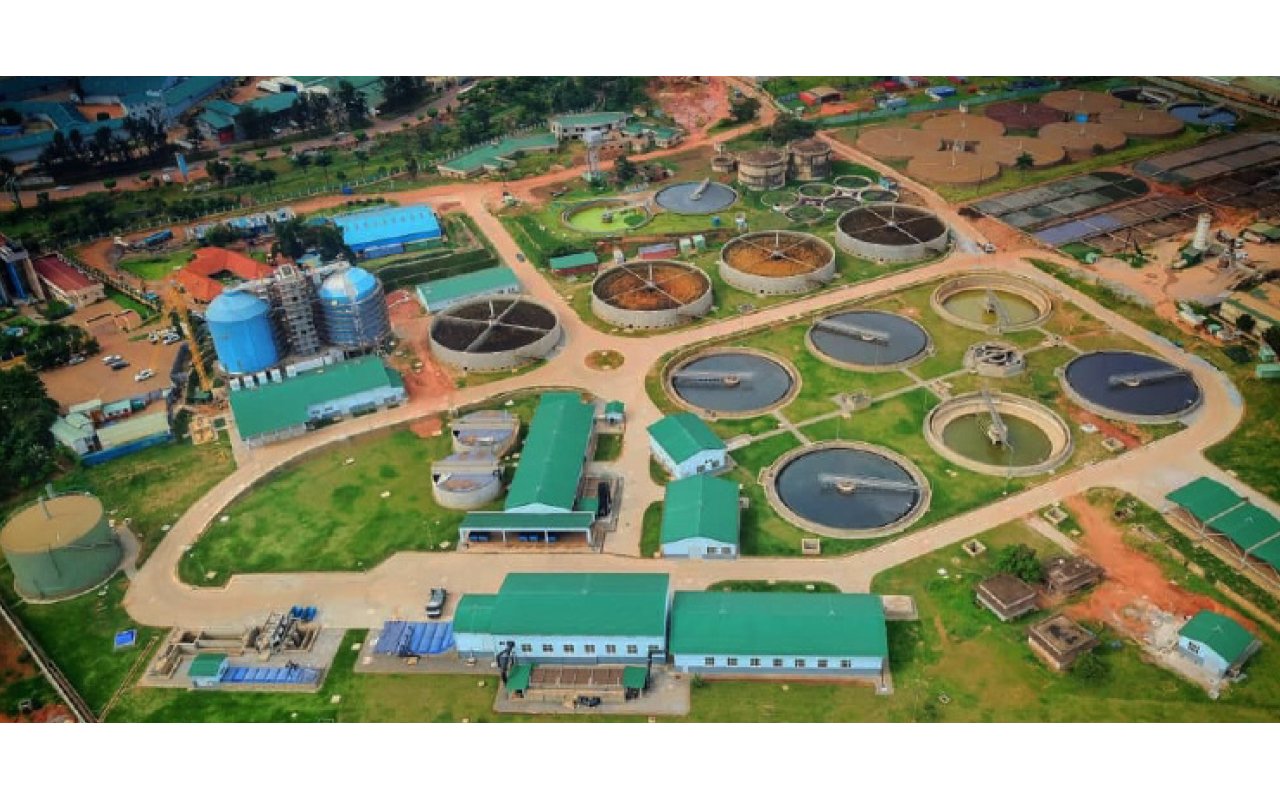
A man sorts items from the garbage at Kiteezi landfill. There should be more funding allocated to green skilling programmes and green projects. PHOTO/MICHAEL KAKUMIRIZI
Resty Namata began her career at Kiteezi Landfill as a sorter earning about Shs7,000, and eventually advanced to a picker, earning at least Shs10,000 daily. But more than half of the workers are women, who turn to this refuge to cope with socio-economic challenges.
"We are 600 women out of about 1,000 workers here at Kiteezi. We have been able to pay school fees for our children through this work," she says.
While Shs7,000 to Shs10,000 might be a turnoff, for Namata, it is a lifeline. The landfill is a metaverse of opportunities. Many of the pickers collect food waste for pigs in their projects. Pickers and sorters are spread to cover plastics, polyethylene, electronic waste, and other value chains. Then others deal directly with the recycling companies.
Juma Semwanga has been at the landfill for the past eight years after being expelled from the city centre during Jennifer Musisi’s tenure as Kampala Capital City Authority executive director. He details the math at his workplace. A kilogramme of water bottles fetches Shs400 as other plastics go for Shs700. Polyethylene costs Shs300 per kilogramme but that is for the low-density material.
On a good day, Semwanga can earn up to Shs15,000. That could change once he sustains cuts from sharp objects and is forced to retire.
The challenges they face are diverse, from injuries caused by sharp objects in the waste to the harsh conditions of dry seasons, which drive many to burn their waste and lower their income.
Despite these difficulties, both Namata and Semwanga value their work. In these piles of discarded material lies untapped wealth that has created a chain of green jobs.
Beyond landfills
Opportunities extend beyond municipal solid waste destined for landfills; they also exist in fecal matter, which can be transformed into valuable resources. Some entities have treated this faecal waste and turned it into purified water.
Hydsan Techniques has found a way of recycling black water – the wastewater collected from toilets in households, institutions and high–rise buildings.
Mark Musinguzi, the director at from Hydsan, sells treatment units. Their clients benefit from reduced water bills and spend less on hiring cesspool emptiers as the amount of waste that would have been collected is reduced while complying with discharge standards set by National Environment Management Authority.
Musinguzi has installed a waste management system at a school of about 800 students that processes 40,000 litres of wastewater daily, with a total investment of Shs150 million.
Waste in a circular economy
Ecoplastile founder and chief executive officer Frank Kamugisha is recycling plastic waste into construction materials. About 360 tonnes of plastics are recovered from the open environment. A mobile platform is being used to hive the entire country into a marketplace as waste is collected from 11 cities, and processed into raw materials and products such as roofing tiles.
The tiles - a blend of plastics, sand and other materials - are produced under chemical-free technology. Lightweight, durable, and environmentally friendly. They are 30 percent less costly and an alternative to timber, associated with deforestation.
"For any three-bedroom house, you are saving a 10-year fully mature tree that you would have cut down to get timber and finish up that roof,” Kamugisha says.
By 2025, his company intends to recycle more than a million kilogrammes of plastics into sustainable tiles per year, targeting the East African market.
At the recent launch of the green industry agenda, Uganda Manufacturers' Association executive director Ezra Muhumuza informed that the cost of manufacturing materials in China has dropped because of adopting environmentally friendly products.
Climate Hub International hopes to collaborate with the government to lead and train on sustainability and educate government agencies about carbon management and footprint reduction. So far, it has established a commercial department focused on promoting eco-friendly products such as clean cooking solutions and distributing renewable energy products such as solar home systems.
Bio char is made from biomass waste such as wood or agricultural waste, paper mill waste or other biological residues. It is currently a growing clean cooking fuel among urban households, adding to briquettes, honey combs and other organic manures.
According to Martha Asasira, the project manager of eco friendly products and special projects at Climate Hub International, before targeting the East African market, they are focused on the Ugandan market, particularly the chicken brooding industry, restaurants, and schools that heavily rely on firewood and charcoal. They currently employ 25 direct staff, 22 commission earners, and around 30 people indirectly involved in collecting carbonised materials.
“With additional support, we could increase employment, especially for girls in sales, distribution, and marketing,” she confirms.
Demystifying green jobs
Green skills are increasingly in demand globally, and upskilling or reskilling is essential to meet this growing need.
Isaac Ndyamuhaki, the founder of Asii Kwanza Uganda, notes that green jobs refer to occupations that focus on environmental sustainability and conservation.
To differentiate between green jobs and green skills, he says, green jobs are works that help to reduce environmental impact, promote eco-friendly practices, and support sustainable development, while green skills are the specific competencies needed to excel in these jobs.
“Green jobs can be found in sectors such as renewable energy, sustainable agriculture, conservation, and eco-tourism,” Ndyamuhaki explains.
On the other hand, green skills, which involve knowledge and abilities essential for thriving in the green industry, include environmental awareness, waste-to-energy conversion, and environmental impact assessment.
To leverage the growing green economy, Ndyamuhaki suggests focusing on various strategies. First, youth should engage in skills acquisition across multiple sectors.
He also urges the government to enhance skilling programmes and update school curriculums to include green economy training.
Similarly, Peter Babyenda, a senior lecturer at Makerere University, provides extra insight into green jobs and skills, citing their role in mitigating climate change and advancing development.
Healthcare, agriculture, transportation, construction, and manufacturing are budding sectors. Fast-growing job opportunities include sustainability managers, wind turbine technicians, and solar consultants. Ecosystem management officers, environmental policy, and clean energy experts are also needed.
Ugandan youth should prepare for the huge potential opportunities that lie ahead of the green economy.



